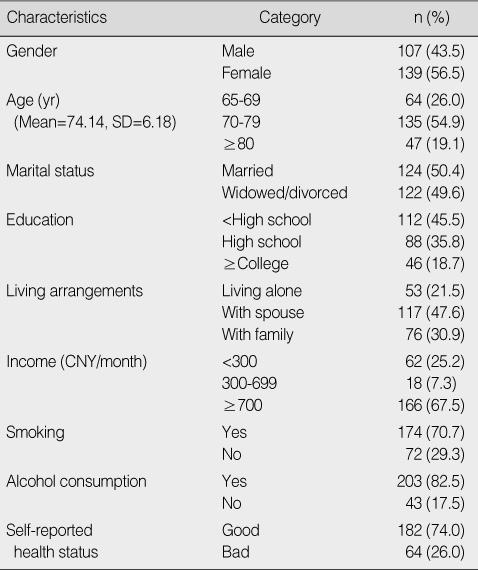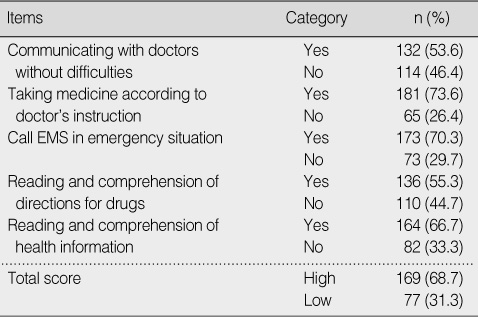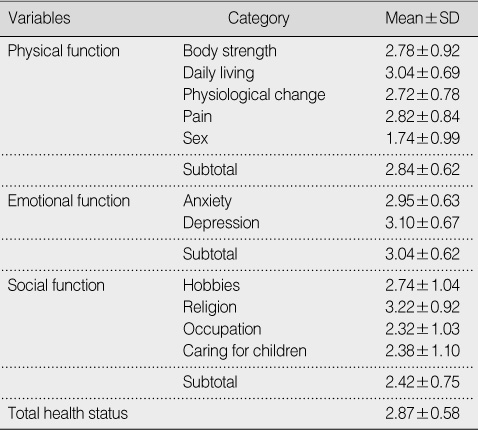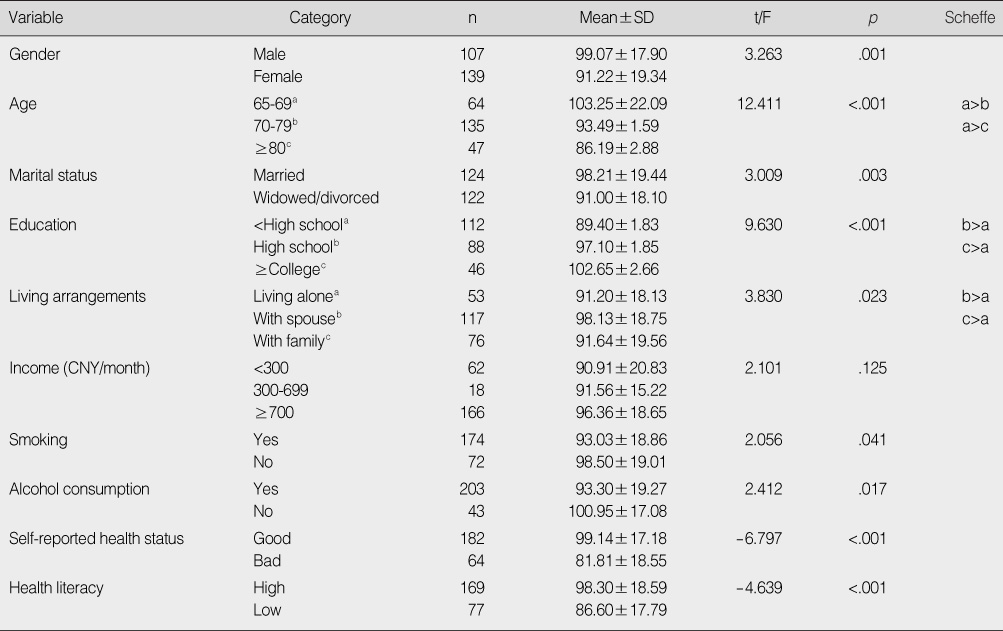Articles
- Page Path
- HOME > J Korean Acad Nurs > Volume 39(3); 2009 > Article
-
Original Article
- Health Literacy and Health Status of Korean-Chinese Elderly People Living in Yanbian, China
- Chun Yu Li, Ogcheol Lee, Gi Soo Shin, Xian Wen Li
-
Journal of Korean Academy of Nursing 2009;39(3):386-392.
DOI: https://doi.org/10.4040/jkan.2009.39.3.386
Published online: June 29, 2009
1Professor, College of Nursing, Yanbian University, Yanji, China.
2Professor, Red Cross College of Nursing, Seoul, Korea.
3Master's Course Student, College of Nursing, Yanbian University, Yanji, China.
- Address reprint requests to: Li, Chun Yu. College of Nursing, Yanbian University, China, 39 Jiankang Road, Yanji city, Jilin Prov., China 133000. Tel: 86-433-266-1005, Fax: 86-433-261-5502, yjlco@yahoo.com.cn
• Received: October 29, 2008 • Accepted: May 19, 2009
Copyright © 2009 Korean Society of Nursing Science
Abstract
-
Purpose
- This descriptive study was done to identify the relationship between health literacy and health status and to provide basic data for developing nursing interventions for Korean-Chinese elders living in Yanbian, China.
-
Methods
- For data collection, intentional sampling of 300 elders was used. The questionnaire was composed of 5 items based on "Ministry of Health, the People's Republic of China (2008)" to measure health literacy, 33 health status items from the "Korean Health Status Measure for Elderly People" developed by Shin (2002), revised for use in China, and 9 general characteristics. Data were analyzed using SPSS Win 13.0 program.
-
Results
- Total level of health literacy was relatively high (68.7%). Elders had high scores for taking medicines according to doctor's instruction, but lower ones for full comprehension through communication with doctors. Health status was high for emotional, physical, and social function in that order. There were significant differences between general characteristics and health status for gender, age, marital status, education, family, smoking, and alcohol consumption in that order. Results of multiple regression analysis for factors influencing health status showed that self-report health level was the most influential, followed by health literacy, age, gender.
-
Conclusion
- Health literacy is the main factor affecting health promotion among minority elders indicating a need to develop health promotion programs for elders who have low health literacy.
- 1. Choi E.J. Relationship between function and health status of elderly in home visiting health program. 2008;Busan, Kosin University. Unpublished master's thesis.
- 2. Cui L, Jin PX, Jin YZ, Fang JN. Comparative study on different types of hypertension among the Korean nationality and Han nationality. Journal of Medical Science Yanbian University. 2006;29:190–194.
- 3. Gazmararian JA, Baker DW, Williams MV, Parker RM, Scott TL, Green DC, et al. Health literacy among medicare enrollees in a managed care organization. The Journal of the American Medical Association. 1999;281:545–551.ArticlePubMed
- 4. Gu L, Du P. Differentia of the old people's self-assessment of their health condition: Based on the national survey of the elderly in 2002 and 2005. South China Population. 2007;22(2):58–64.
- 5. Kim JS. Comparisons of health status and health care needs between institutionalized and community-living elders. 2007;Seoul, Ewha University. Unpublished master's thesis.
- 6. Kim KJ. Correlations among perceived health status, depression and physical health status in elderly. 2002;Busan, Catholic University of Pusan. Unpublished master's thesis.
- 7. Kim MT, Han HR, Kim KB, Duong D. The use of traditional and western medicine among Korean American elderly. Journal of Community Health. 2002;27:109–120.PubMed
- 8. Li CY, Li SZ, Chen B, Jin YH, Jin YA. The survey of health status and home care services of Yanbian residents. Chinese Journal of Nursing. 2001;36:628–629.
- 9. Lim CY, Kim KH. Research study on the national identity of Koreans in Yanbian autonomous prefecture, China. Korean Journal of Political Science. 2002;10:1–17.
- 10. National civil affairs report. Ministry of Civil Affairs of People's Republic of China. 2007;May 26 Retrieved September 10, 2007. from http://cws.mca.gov.cn/accessory/200806/1214811949213.doc.
- 11. National people's health literacy-Basic knowledge and function. Ministry of Health of The People's Republic of China. 2008;February 6 Retrieved February 7, 2008. http://www.moh.gov.cn/publicfiles/business/htmlfiles/mohfybjysqwss/s7907/200804/18212.htm.
- 12. Paasche-Orlow MK, Parker RM, Gazmararian JA, Nielsen-Bohlman LT, Rudd RR. The prevalence of limited health literacy. Journal of General Internal Medicine. 2005;20:175–184.PubMedPMC
- 13. Park JM, Han SH. The effect of exercise program on health and depression in the elderly. Journal of Korean Academy of Nursing. 2003;33:220–227.PubMed
- 14. People's Republic of China (PRC) national blood pressure survey cooperative group. A survey on the prevalence of hypertension in different ethnic groups in China. Chinese Journal of Hypertension. 1995;3(A01):24–30.
- 15. Rebecca L, Sudore KM, Mebta EM, Simonsick TB. Limited literacy in older people and disparities in health and healthcare access. The American Geriatrics Society. 2006;54:770–776.
- 16. Schillinger D, Grumbach K, Piette J, Wang F, Osmond D, Daher C, et al. Association of health literacy with diabetes outcomes. Journal of the American Medical Association. 2002;288:475–482.ArticlePubMed
- 17. Shin HC, Kim CH, Cho BL, Won JW, Song SW, et al. The development of a Korean health status measure for the elderly. The Journal of the Korean Academy of Family Medicine. 2002;23:440–457.
- 18. Shin KR, Kang YH, Jung DK, Choi KA. A study on the depression, somatic symptom, activities of daily living for the elderly women in an urban area. Journal of Korean Academy of Nursing. 2007;37:1131–1138.ArticlePubMedPDF
- 19. Song RY, June KJ, Ro YJ, Kim CG. Effects of motivation-enhancing program on health behaviors, cardiovascular risk factors, and functional status for institutionalized elderly women. Journal of Korean Academy of Nursing. 2001;31:858–870.ArticlePDF
- 20. Health promotion glossary (WHO/HPR/HEP/98.1). World Health Organization. 1998;Retrieved fromwww.who.int/hpr/NPH/docs/hp_glossary_en.pdf.
- 21. Wu SY, Fang JN, Quan ZY, Cui LH, Jin CJ. Analysis of the mortality between Korean-Chinese and Han-Chinese in Yanji City. Chinese Journal of Health Statistics. 2004;21:46–47.
- 22. Xuan JL, Jin H, Han CJ. Comparison of depression and anxiety of Korean and Han climacteric residents in community. Journal of Chinese Mental Health. 2008;22:40–42.
- 23. Yao JH. On community health service from healthy aging. Chinese Primary Health Care. 2000;14(12):12–14.
- 24. Zhu CB. The research progress of essential hypertension epidemiology in minority of China. Bulletin of Medical Research. 2005;34(5):57–59.
REFERENCES
Figure & Data
REFERENCES
Citations
Citations to this article as recorded by 

- Impact of Parents' Oral Health Literacy on Their Own and Their Children's Oral Health in Chinese Population
Yu Wang, Marita R. Inglehart, Chao Yuan
Frontiers in Public Health.2022;[Epub] CrossRef - Factors associated with health literacy among older adults: Results of the HLS-EU-Q16 measure
Heeran Chun, Ju Yul Lee
Korean Journal of Health Education and Promotion.2020; 37(1): 1. CrossRef - Food Literacy in South Korea: Operational Definition and Measurement Issues
Dahyun Park, Min-Jeong Shin, Sunmi Song
Clinical Nutrition Research.2019; 8(2): 79. CrossRef - Survey of health literacy level and related influencing factors in military college students in Chongqing, China: A cross-sectional analysis
Honghui Rong, Xin Cheng, Jose M. Garcia, Ling Zhang, Lu Lu, Jian Fang, Mingshan Le, Peng Hu, Xinlu Dong, Junli Yang, Ya Wang, Ting Luo, Jun Liu, Ji-an Chen, Noora Hirvonen
PLOS ONE.2017; 12(5): e0177776. CrossRef - Barriers, Attitudes, and Dietary Behaviors Regarding Sodium Reduction in the Elderly Korean-Chinese Population in Yanbian, China
Jounghee Lee, Wenying Cui, Meixiang Jin
Osong Public Health and Research Perspectives.2017; 8(3): 185. CrossRef - Letramento funcional em saúde na perspectiva da Enfermagem Gerontológica: revisão integrativa da literatura
Maria Izabel Penha de Oliveira Santos, Marilene Rodrigues Portella, Helenice de Moura Scortegagna, Paulo Cassiano Simor dos Santos
Revista Brasileira de Geriatria e Gerontologia.2015; 18(3): 651. CrossRef - Health literacy in Mainland China: Validation of a functional health literacy test in simplified Chinese
S. Mantwill, P. J. Schulz
Health Promotion International.2015;[Epub] CrossRef - A Study on Relationships between Health Literacy, Disease-related Knowledge and Compliance to Medical Recommendations in Patients with Hypertension
Myung Soon Kwon, Ghee-Young Noh, Ji Hye Jang
Journal of Korean Public Health Nursing.2013; 27(1): 190. CrossRef - A cross-sectional study on oral health literacy and its influencing factors among adults: II. Functional oral health literacy
Hyun-Jeong Ju, Hyo-Won Oh, Heung-Soo Lee
Journal of Korean Academy of Oral Health.2013; 37(2): 81. CrossRef - Health Literacy: An Evolutionary Concept Analysis
Sungeun Kim, Jina Oh, Yunmi Lee
The Journal of Korean Academic Society of Nursing Education.2013; 19(4): 558. CrossRef - Health Literacy and Multicultural Populations
Mercedes Benitez McCrary, Eva Jackson Hester
Perspectives on Communication Disorders and Sciences in Culturally and Linguistically Diverse (CLD) Populations.2011; 18(3): 79. CrossRef - Exercise Performance and Exercise-related Factors of Korean and Korean-Chinese Nursing Students: A comparative Study
Young-Ran Lee, Sun-Nam Park, Sook-Ja Yu, Jung-Soon Moon
Journal of Korean Academy of Community Health Nursing.2011; 22(3): 234. CrossRef - Commentary: Response regarding the commentary of van der Ploeg W. Assessment and measurement of health literacy: An integrative review of the literature. Nursing & Health Sciences 2010; 12: 145-146
Josephine M. Mancuso
Nursing & Health Sciences.2010; 12(3): 304. CrossRef
Health Literacy and Health Status of Korean-Chinese Elderly People Living in Yanbian, China
Health Literacy and Health Status of Korean-Chinese Elderly People Living in Yanbian, China
General Characteristics of the Elders (N=246)
CNY=China Yuan.
Scores for Health Literacy
Level of Health Status
Health Status according to General Characteristics and Health Literacy
CNY=China Yuan.
Factors influencing Health Status
Table 1
General Characteristics of the Elders (N=246)
CNY=China Yuan.
Table 2
Scores for Health Literacy
Table 3
Level of Health Status
Table 4
Health Status according to General Characteristics and Health Literacy
CNY=China Yuan.
Table 5
Factors influencing Health Status
 KSNS
KSNS
 E-SUBMISSION
E-SUBMISSION





 Cite
Cite

